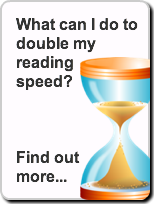My colleague Robert Good recently wrote about creating effective report introductions - a difficult task at the best of times. Another area that can fall into the difficult category is report writing headings. There are quite a few questions about this from writers. I've briefly answered the most frequently-asked below:
Communicado: Business Communications Blog
Andrew Jackson
Recent Posts
Creating Audience Focused Report Writing Headings
Posted by Andrew Jackson on Jun 11,2010 @ 03:33 PM
Topics: Report Writing, Communication skills
Speed reading tips part 4: measuring your reading speed
Posted by Andrew Jackson on May 14,2010 @ 03:45 PM
In the last of his introductory blog posts giving speed reading tips, Alex our Speed Reading Coach, explains how to measure your reading speed and what the results mean. Over to you, Alex...
Topics: Communication skills, speed reading
Speed reading tips part 3: left brain, right brain
Posted by Andrew Jackson on Apr 30,2010 @ 03:45 PM
In the second of his posts introducing speed reading tips, Alex Garcez our Speed Reading Coach explains the differences between using the left side of the brain and the right side when you are reading. Alex, over to you...
Topics: Communication skills, speed reading
Speed reading tips part 2: read more in less time
Posted by Andrew Jackson on Apr 16,2010 @ 03:45 PM
Today, we're delighted to introduce you to our guest blogger Alex Garcez, aka The Speed Reading Coach. Over to you Alex...
Topics: Communication skills, speed reading
Speed reading tips - the benefits of reading faster
Posted by Andrew Jackson on Apr 9,2010 @ 03:45 PM
You know already that when I'm banging on about better business writing, I focus relentlessly on the needs of the audience. I do this because I know that clearly written, well-structured content improves comprehension and enables audiences to read content more quickly and efficiently. In my ideal world, all content would be clearly written and well-structured. In the real world, of course, it rarely is.
So one of the things frequently on my mind is what to do when you are a reader (rather than a writer) and you are faced with a mass of poorly written unstructured content (or indeed a mass of well-written but poorly structured content) and you have no choice but to wade through it.
Speed reading is a solution that's been floating around on the edge of my universe for some time, but if I'm honest I've always been a little sceptical. Could it really work? Anyway, a few months ago, I finally decided to take the plunge and give it go - and I'm now convinced it does work.
My guide on this recent journey has been Alex Garcez, also known as the Speed Reading Coach.
Here at Pacific Blue, we've decided to team up with Alex and over the next few weeks he will be a guest blogger, bringing us some background information about speed reading and providing a series of speed reading tips to introduce you to his proven techniques.
When you stop to think about it, the benefits of being able to read faster are blindingly obvious. You can look at it two ways. Either you could take the view that reading faster lets you get your reading done more efficiently and frees you up to do more of the things you want to do. Or you could take the view that reading faster enables you to absorb more knowledge and expertise than you are currently able to.
Interestingly, Alex tells me that a joint study by the US Department of Labor and Yahoo has identified a link between the number of business books people read and their relative earning power. The study concluded that people who read a minimum of 7 business books a year earn around 2.3 times more than those who just read one.
Whatever your motivation for wanting to read faster, it seems to me it's a bit of a no-brainer. So watch out as Alex reveals some of his speed reading tips over the coming weeks.
And if you can't wait, we are now running speed reading courses with Alex.
Topics: Communication skills, speed reading
I noticed recently that quite a lot of people visiting our website had arrived after searching using the phrase advantages of report writing. This is interesting because inherent in this search phrase is Bette's question. When you spend many hours of your waking life thinking about how to make business writing and communications better, it is easy to lose sight of that basic Bette question, 'Why bother?'
So this post takes us back to basics to think about the advantages of report writing and answer the question, 'Why bother?' Why write a report rather than shove everything in an email?'
I'm going back several years, but I can think of an organisation we worked for who had gone the route of communicating almost entirely by email. Worse still, (because they could), employees copied each other in on almost everything. Everyone spent hours sifting through piles of unformatted, poorly written guff - just in case there was a nugget of information relevant to them. Email communication was totally out of control.
Our role was to re-introduce the skill of report writing. I like to think we did some good, but in honesty, our intervention felt hopeless - at that particular moment, it was clear we were swimming against the tide.
Not long after this, the company in question was taken over and their brand vanished for ever. I'm not suggesting their obsession with email was the cause of their demise, but I'm fairly clear it was a symptom of the organisation's wider dysfunction; and this wider dysfunction was definitely a factor in them getting swallowed up by a more successful competitor.
So my first point is this: bother with report writing because an email only culture almost always brings more problems than it solves - even though, at first, email only may seem an attractive solution.
So why else would you bother writing a report - what are some of the other advantages?
Structuring and sequencing content
If you read my recent comments on using post-it notes, you'll know I believe an audience focused structure and information hierarchy is fundamental to the success of a report or similar document. Up to a point, you can create this in email format, but because email was never really designed with this mind, you have to work twice as hard to achieve success. When most people struggle to adequately structure even short emails, I wouldn't hold out much hope for it happening with longer communications.
Formatting to reinforce the hierarchy
If you are serious about your structuring and sequencing, you will also be diligent about applying a simple but consistent set of formatting styles to help your audience identify and understand the different elements of this hierarchy and sequence. Not impossible to achieve using email; but much, much easier in a word processed format.
Referencing content
Individually, simple things like tables of contents, headers and footers, hyperlinks within documents and good old page numbering make small but important contributions to an audience being able to navigate around and make sense of what's going on. Collectively, they make a very powerful contribution to the understanding of content and an audience's sense of where they are in the bigger whole.
Distributing the end product
As the now-defunct company demonstrated, it's the easiest thing in the world to cc almost everyone into an email. When you are distributing a paper-based report or emailing it out as an attachment, you are far more likely to think about who should receive a copy.
The act of writing
There's no question that emails are perceived by both writers and recipients as a bit light weight - something that can be polished off in a few minutes. The very act of writing a report or a document immediately adds to the significance of the content. Writing a document or report means you are far more likely to:
- carry out an audience analysis
- give serious consideration to your content and how it should be organised
- see the document's creation as an important and time-consuming task (of course, this last point can be both good and bad)
Finally, viewed from the audience's perspective, would you sign off an important business case proposed only by email? Unlikely, I think.
So next time you are faced with the task of writing a report or document and you hear Bette Midler's question echoing in your head, remember the alternative: dysfunctional, email hell.
Topics: Report Writing, Communication skills
This was in a slightly less politically correct age. Now, there's probably a law against what I'm about to describe, but in those days most TEFL staff rooms had a dog-eared piece of paper tacked to the wall for teachers to record 'howlers'. 'Howlers' were instances of a moment in class when one of your students would make a mistake and unknowingly say something rude or ridiculous. What they said would want to make you laugh out loud - hence the name, 'howler'.
Most of these 'howlers' tended to be rude rather than ridiculous, and of the few I can still remember, they are far too risque to repeat to high-minded Communicado blog readers!
I've recently been reminded of these 'howlers' for a couple of reasons. A few days ago I noticed a post on our Business Communications Hub from Lynn Gartner Johnson's Business Writing Blog which was talking about correcting writing errors made by non-native speakers. We've also recently teamed-up with a company called Video Teachers to offer live, online language learning programmes. So the whole question of applying language teaching methodologies (of which error-correction is a major element) has also been on my mind.
My reason for writing this post is to add a bit more to answer the question posed by Lynn on her blog. Namely, should we correct the language mistakes of non-native speakers?
In the confines of the language-learning classroom (either real or virtual), correcting errors is, of course, one of the things a teacher is required to do. So for a diligent TEFL teacher, the question is not do you correct, but how much do you correct. Some students are so error prone that if you stopped to correct every mistake, the poor devils would never utter a complete sentence without your intervention. So it's all a matter of balancing the need to instill accuracy against the desire to encourage fluency.
But what about outside a structured language learning environment? Should you correct?
Lynn cites one of her course delegates as saying he wished someone had corrected a recurring mistake of his long ago. He's clearly a language learner who cares about being accurate, and is grateful to you for pointing out his error. However, there are language learners who just love to talk (or write), get irritated at being corrected and in the end just burble on regardless. Sure, if pressed, they pay lip-service to the need for accuracy but basically they are not that bothered. Over time, these learners rarely improve significantly. They are just happy to communicate - however inaccurately.
So personally, I don't think there's a clear cut answer to Lynn's question. Some people will be eternally grateful for your corrections, some will be irritated, some just won't care! Take your pick.
However, having said all that, once you've been trained as a TEFL teacher, there's a small part of you that never stops being aTEFL teacher. And unfortunately, I'm living proof - because I have to confess that from time-to-time, I do find myself going into TEFL teacher correction (or teach) mode without even thinking about it.
Sometimes in restaurants or shops, (much to the embarrassment of some of my friends) if there's a bit of communication difficulty with a member of staff with minimal English, I sometimes just can't help myself - or at least that's my story!
Topics: Communication skills
Improve your document and report writing with post-it notes
Posted by Andrew Jackson on Mar 19,2010 @ 02:30 PM
Yes, you did read that title correctly. And in case you think I've lost my marbles, I promise you I haven't! Ask anyone who has worked with me. If there's some complex document or report writing to be done, my wall gets covered with brightly coloured post-it notes.
'Why?' is a question you may well be asking? In previous posts, I've mentioned some of the benefits of and techniques for writing in a more structured way.
Using post-it notes is really about taking a structured approach to writing to the next level - the document level.
You see, each post-it note I use represents a chunk or module of content. I have a heading for each module written on the post-it note, so I know the approximate content it represents. I also use larger post-it notes to define topics (groups of related modules) and a different size again to define groups of related topics. These bigger sized notes also have headings written on them. I also find it useful to have different coloured post-its for each of these different levels of content.
Perhaps you are beginning to see that this seeming madness isn't quite so mad after all. If you are still bemused, let me explain a bit more. Using post-it notes allows me to experiment with a variety of structures and sequences for my content. I can move them around on my wall and consider several options for the structure and sequence before I've written a word. In other words, I get a birds-eye view of the content and different ways of organising it without being bogged down in the detail.
It's also a great way of getting some instant reviews or feedback from colleagues. Give them a first draft document with a request to review the structure and they have to read the whole thing before they can make an informed judgment. Get them to take a look at your post-it note outline on the spot, talk them through it briefly and they can give you some feedback in a matter of minutes.
Once I'm happy with an outline, I can easily capture the structure in a Word document and start filling in the detail. And I can write the content in any order I like. If I'm waiting for content for particular modules or topics from someone else, I can still go ahead and write the parts of the document where I have content already.
So next time you visit the stationery cupboard choose a few different sized post-it notes in different colours. Your colleagues may raise their eyebrows, but you can be confident you'll be raising your report writing game.
Topics: Report Writing, Communication skills
Well, you may have noticed we’ve been absent from publishing in the blogosphere for a couple of months; but not absent from monitoring its goings on.
In case you aren’t aware, my colleague Robert Good has been doing a grand job keeping our Business Communications Hub ticking over in recent weeks.
I was amused by a recent post he linked to commenting on the thoughts of Britain’s luvy-in-chief, Stephen Fry in one of his podcasts.
Apparently, business report writing certainly shouldn’t be focusing on grammar and punctuation; and business writers should be trying to embrace the richness of the English language because, in his view, business writing has squeezed all life out of the language.
Here’s the problem. Stephen is hugely talented, with an Oxbridge education. He’s a man who makes his living out of embracing the richness of the language. He loves the language, is totally confident in his command of it and makes it work beautifully to his advantage.
People with this kind of talent are first, fairly rare and second, prone to forget that not everyone shares their talent for linguistic playfulness and curiosity.
Topics: Report Writing
The term blended learning seems to have been around for ever. It's one of those concepts that appears highly attractive and it's something that various people and organisations have flirted with on and off for a long time, but to me, it never really seems to have taken hold. (By the way, I'd love to be proved wrong on this one - so if you are a person or organisation seriously using blended learning, I'd love to hear about it).
Also, I suspect it's one of those terms that means different things to different people. For what it's worth, I've always thought of it as a way of bringing together e-learning and classroom training.
Perhaps part of the problem with my version of blended learning is that it aims to bring together two very different approaches to learning. Maybe it's too much to expect people with a definite preference for either e-learning or classroom training to suddenly be okay with learning from both approaches.
Topics: e-learning, e-learning software










